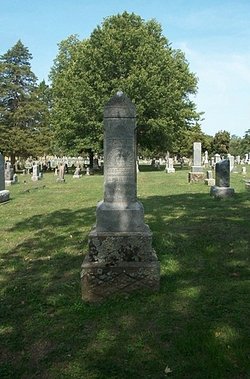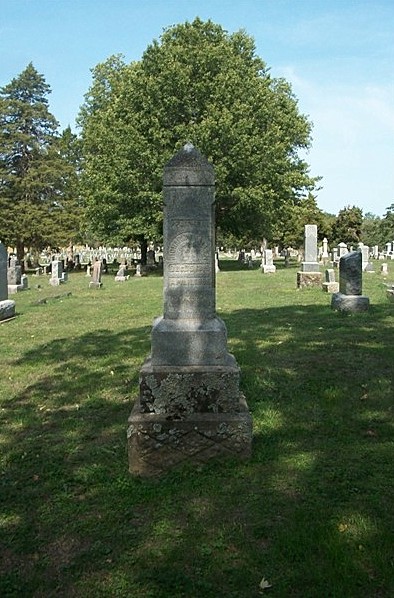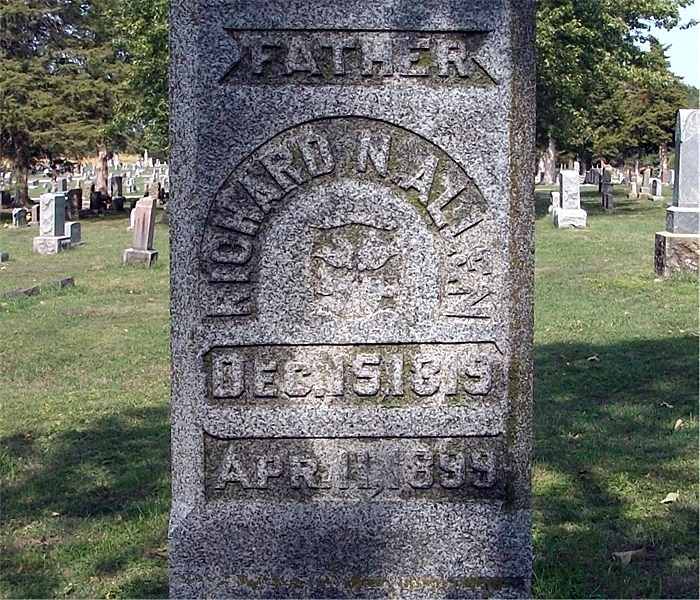New Home Township - Major Richard N. Allen was born in Baltimore County, Maryland, December 15, 1819. His parents, Richard N. and Sarah (Hughes) Allen, were natives of County Down, Ireland, and settled in Maryland about the year 1796. Richard was the sixth of eleven children, of whom but himself and one brother survive, Colonel Robert T.P. Allen, a graduate of West Point, and who served in the United States Army as lieutenant; he now lives in Florida. He was also attached to the topographical engineer corps and built the harbors of Silver Creek and Portland on Lake Erie. He founded the Kentucky Military Institute, and during the rebellion was colonel of a Texas regiment, and his son, Robert D. Allen, is the present president of the institute. In 1836 Mr. Allen assisted his brother Robert in building the two ports just named, and in '38 he entered the Alleghany College at Meadville, Pennsylvania, from which institution he graduated in 1840. He then entered the law office of Hiram L. Richmond, and pursued his law studies one year, and was admitted to the practice of law at the Crawford County bar in 1841. He had married while attending college, on March 10, 1840, Miss Jeannette Campbell, a native of New York, but of Scotch descent. Mr. Allen practiced law in Pennsylvania for one year and then removed to Kaskaskia, Illinois, and followed the practice of his profession until 1844, being contemporary with such men as Dr. Bissel, Judge Sidney Breeze and General Shields, and he was the cause of the famous quarrel between General Shields and Judge Breeze. While coming down the Ohio River, on his way to Illinois, his hat, in which he carried his certificate, was blown into the river. He saved the diploma by jumping into the water. Its becoming wet had effaced the impression of the seal, and for this reason Judge Breeze refused him admittance to the bar. General Shields made a speech pressing Mr. Allen's claim for recognition. In his remarks he said something at which Judge Breeze took exception and commanded Shields to take his seat. Shields, with arms folded, replied that "If the court please I prefer to stand." The second time the Judge made the command. Shields' reply was the same. The Judge fined him ten dollars. The General pulled out his pocket book and paid it. The Judge made the same demand the third time. The same reply was made. A fine of twenty dollars was entered and as quickly paid. The General refused the fourth time and he was remanded to jail. To jail he went, accompanied by his friends. He was released the next morning. The result was Shields challenged Judge Breeze, and upon his refusing to fight the General published him as a coward. In 1844 Mr. Allen went to Sweet Lick Spring, Kentucky, where he practiced for two years. In 1846 he accepted a professorship in the Kentucky Military Institute, which he filled until 1849. In company with his brother, with whom he had been connected in the institute, he went to California, Robert having received the appointment of Assistant Postmaster General to establish post offices and post routes. He engaged in mining one summer, and in the following winter he and his brother purchased a one-half interest in the Pacific News, paying therefor $24,000. In 1850 the first steam press on the Pacific coast was secured and put in operation. General Winchester, of New York, was employed as editor, and Mr. Allen himself was city editor. In the winter of 1850 the building, press, and everything connected with the office was burned, making a loss of $80,000. Major Allen was in New York at the time of the fire and never went back to California. In 1852 he returned to the Institute and until the outbreak of the war held the position of quarter-master. During the war he engaged in farming, and was employed by Jay Cook, who is his brother-in-law, Mr. C. having married his only sister, to establish agencies in Missouri and Kansas for the sale of 5-20 and 5-30 bonds. The institute having revived in 1866 he was given the same position, which he continued to hold until 1873 when he resigned. In 1875 he came to Bates County and has since been occupied in farming, having a farm of 320 acres. He has nine children: Sarah, (wife of John B. Batchellor, of Deepwater); William H., a physician of Rich Hill, his wife was a Miss Ara Sims, of Texas; Emma Jane died at the age of twenty-three years, at Frankfort; Robert T.P., his first wife was a niece of Colonel Samuel F. Hawkins, and died in 1876, he has recently married Miss Libbie Katron, of Vernon County; Richard N., at home; Ebenezer N., a physician at Coolidge, Kansas; Hugh C., at home; Jacob D., recently graduated from the Military Institute; and Elizabeth Cook, at home. In politics Major Allen is a Democrat. He is a member of the Methodist Church, South, and has been a Mason for upwards of thirty years, having joined the order in San Francisco. (History of Bates County, Missouri, 1883)
New Home Township - Major Richard N. Allen was born in Baltimore County, Maryland, December 15, 1819. His parents, Richard N. and Sarah (Hughes) Allen, were natives of County Down, Ireland, and settled in Maryland about the year 1796. Richard was the sixth of eleven children, of whom but himself and one brother survive, Colonel Robert T.P. Allen, a graduate of West Point, and who served in the United States Army as lieutenant; he now lives in Florida. He was also attached to the topographical engineer corps and built the harbors of Silver Creek and Portland on Lake Erie. He founded the Kentucky Military Institute, and during the rebellion was colonel of a Texas regiment, and his son, Robert D. Allen, is the present president of the institute. In 1836 Mr. Allen assisted his brother Robert in building the two ports just named, and in '38 he entered the Alleghany College at Meadville, Pennsylvania, from which institution he graduated in 1840. He then entered the law office of Hiram L. Richmond, and pursued his law studies one year, and was admitted to the practice of law at the Crawford County bar in 1841. He had married while attending college, on March 10, 1840, Miss Jeannette Campbell, a native of New York, but of Scotch descent. Mr. Allen practiced law in Pennsylvania for one year and then removed to Kaskaskia, Illinois, and followed the practice of his profession until 1844, being contemporary with such men as Dr. Bissel, Judge Sidney Breeze and General Shields, and he was the cause of the famous quarrel between General Shields and Judge Breeze. While coming down the Ohio River, on his way to Illinois, his hat, in which he carried his certificate, was blown into the river. He saved the diploma by jumping into the water. Its becoming wet had effaced the impression of the seal, and for this reason Judge Breeze refused him admittance to the bar. General Shields made a speech pressing Mr. Allen's claim for recognition. In his remarks he said something at which Judge Breeze took exception and commanded Shields to take his seat. Shields, with arms folded, replied that "If the court please I prefer to stand." The second time the Judge made the command. Shields' reply was the same. The Judge fined him ten dollars. The General pulled out his pocket book and paid it. The Judge made the same demand the third time. The same reply was made. A fine of twenty dollars was entered and as quickly paid. The General refused the fourth time and he was remanded to jail. To jail he went, accompanied by his friends. He was released the next morning. The result was Shields challenged Judge Breeze, and upon his refusing to fight the General published him as a coward. In 1844 Mr. Allen went to Sweet Lick Spring, Kentucky, where he practiced for two years. In 1846 he accepted a professorship in the Kentucky Military Institute, which he filled until 1849. In company with his brother, with whom he had been connected in the institute, he went to California, Robert having received the appointment of Assistant Postmaster General to establish post offices and post routes. He engaged in mining one summer, and in the following winter he and his brother purchased a one-half interest in the Pacific News, paying therefor $24,000. In 1850 the first steam press on the Pacific coast was secured and put in operation. General Winchester, of New York, was employed as editor, and Mr. Allen himself was city editor. In the winter of 1850 the building, press, and everything connected with the office was burned, making a loss of $80,000. Major Allen was in New York at the time of the fire and never went back to California. In 1852 he returned to the Institute and until the outbreak of the war held the position of quarter-master. During the war he engaged in farming, and was employed by Jay Cook, who is his brother-in-law, Mr. C. having married his only sister, to establish agencies in Missouri and Kansas for the sale of 5-20 and 5-30 bonds. The institute having revived in 1866 he was given the same position, which he continued to hold until 1873 when he resigned. In 1875 he came to Bates County and has since been occupied in farming, having a farm of 320 acres. He has nine children: Sarah, (wife of John B. Batchellor, of Deepwater); William H., a physician of Rich Hill, his wife was a Miss Ara Sims, of Texas; Emma Jane died at the age of twenty-three years, at Frankfort; Robert T.P., his first wife was a niece of Colonel Samuel F. Hawkins, and died in 1876, he has recently married Miss Libbie Katron, of Vernon County; Richard N., at home; Ebenezer N., a physician at Coolidge, Kansas; Hugh C., at home; Jacob D., recently graduated from the Military Institute; and Elizabeth Cook, at home. In politics Major Allen is a Democrat. He is a member of the Methodist Church, South, and has been a Mason for upwards of thirty years, having joined the order in San Francisco. (History of Bates County, Missouri, 1883)
Family Members
Advertisement
Explore more
Sponsored by Ancestry
Advertisement











